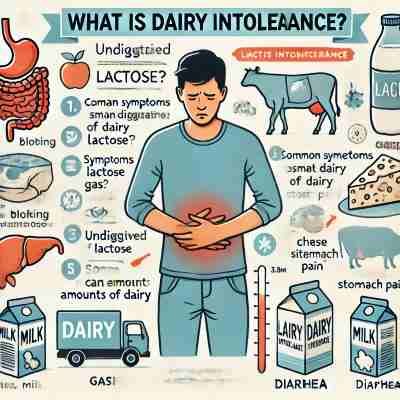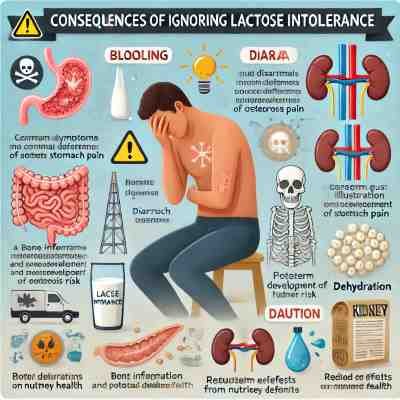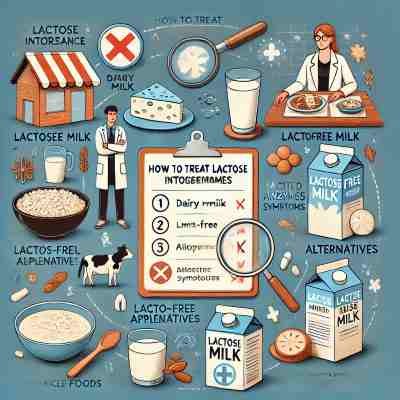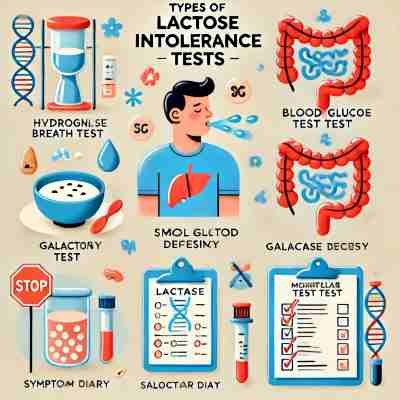Dairy intolerance, or lactose intolerance, occurs when the body cannot fully digest lactose, a sugar found in dairy products like milk, cheese, and yogurt.
This happens due to a lack of lactase, the enzyme needed to break down lactose in the digestive system. When left untreated or ignored, it can lead to digestive discomfort such as bloating, gas, and diarrhea and may cause further health complications over time.
Recommended Reading: Cetirizine Side Effects: Uses, Dosage, & Benefits
Dairy Intolerance: What Happens If You Ignore Lactose Intolerance?

Table Of Contents
Recommended Reading: 10 Signs Of Kidney Stones: Causes, Symptoms, Diagnosis & Treatment
What is Dairy Intolerance?
Dairy Intolerance
Dairy intolerance refers to difficulty digesting dairy products, often leading to symptoms like bloating, gas, and stomach discomfort. It is commonly linked to lactose intolerance.

Dairy intolerance, also called lactose intolerance, happens when your body can’t digest lactose, the sugar found in dairy products. This is due to a shortage of lactase, an enzyme needed to break down lactose into smaller sugars, like glucose and galactose, which the body can absorb.
How Does It Affect You?
When your body doesn’t have enough lactase, lactose stays undigested in the gut, leading to uncomfortable symptoms such as:
- Bloating
- Gas
- Diarrhea
- Stomach pain
These symptoms often occur after consuming milk, cheese, yogurt, or any other dairy product.
Important Points
- Lactose intolerance varies in severity. Some people can tolerate small amounts of dairy, while others might react to even a little bit.
- Ignoring dairy intolerance can worsen digestive discomfort and impact overall well-being.
Recommended Reading: How To Prevent Vitiligo? Causes, Symptoms, & Treatment
Consequences Of Ignoring Lactose Intolerance
Consequences
Ignoring lactose intolerance can lead to ongoing digestive issues like bloating and diarrhea, along with potential long-term problems such as nutrient deficiencies and gut inflammation. Managing symptoms early helps avoid serious health risks.

| Issue | Details |
|---|---|
| Continued Digestive Discomfort | Ignoring lactose intolerance can lead to ongoing symptoms like abdominal pain, bloating, gas, and diarrhea, which may get worse over time. |
| Nutritional Deficiencies | Dairy is rich in calcium, vitamin D, and protein. Avoiding dairy without proper alternatives can cause deficiencies, leading to weak bones and a higher risk of fractures. |
| Gut Inflammation | Constant lactose consumption can cause inflammation in the digestive tract, increasing the risk of chronic issues like Irritable Bowel Syndrome (IBS) or Inflammatory Bowel Disease (IBD). |
| Chronic Diarrhea | Ignoring the intolerance can result in frequent diarrhea, which may lead to dehydration and nutrient loss. |
| Dehydration | Severe diarrhea without proper hydration can cause dehydration, which can become a serious health risk if not addressed promptly. |
| Anemia | Chronic diarrhea can cause iron and blood loss, leading to anemia over time if the condition persists. |
| Kidney Damage | Prolonged dehydration due to diarrhea may result in kidney damage, which can have long-term health consequences. |
| Increased Risk of Osteoporosis | Avoiding dairy without replacing calcium can lead to weaker bones and increase the likelihood of developing osteoporosis later in life. |
| Development of IBS or IBD | Chronic inflammation from lactose consumption can contribute to conditions like IBS or IBD, which are long-term gastrointestinal disorders. |
| Reduced Quality of Life | Constant digestive issues, mood changes, and nutrient deficiencies can lead to fatigue, irritability, and overall physical weakness, affecting daily life. |
Recommended Reading: Continuous Glucose Monitor Price In Pakistan [CGM Types, Uses, & Prices]
How To Treat Lactose Intolerance Symptoms?
Treatment
Lactose intolerance symptoms can be managed by reducing or avoiding dairy products, using lactase supplements, and choosing lactose-free alternatives. These steps help prevent discomfort and maintain proper nutrition.

| Treatment Method | Details |
|---|---|
| Identify Your Lactose Tolerance | Keep track of how much dairy you can consume without symptoms. This helps determine your personal tolerance level. |
| Limit or Avoid Dairy | Reduce dairy intake and choose lactose-free options such as lactose-free milk, yogurt, and cheese. |
| Lactose-Free Alternatives | Replace regular dairy products with lactose-free versions to enjoy dairy without the symptoms. |
| Non-Dairy Alternatives | Opt for plant-based milk like almond, soy, or rice milk, which are naturally lactose-free and easy on the stomach. |
| Eat Dairy with Meals | Eating dairy with a meal may help some individuals tolerate small amounts of lactose better, reducing symptoms. |
| Check Food Labels | Lactose can be hidden in processed foods like bread, cereals, and sauces, so it’s important to read labels carefully. |
| Take Lactase Supplements | Taking lactase enzymes before eating dairy helps your body break down lactose, preventing symptoms like bloating and diarrhea. |
| Choose Tablets or Drops | Lactase supplements come in tablet or liquid drop forms, offering convenient options for different needs. |
| Ensure Adequate Calcium & Vitamin D | If you avoid dairy, make sure you get enough calcium and vitamin D from other foods or supplements to maintain strong bones and prevent deficiencies. |
| Consult a Doctor | Always check with a healthcare provider before starting lactase supplements or making significant dietary changes, especially if you have other medical conditions. |
| Over-the-Counter Medications | For occasional relief, Immodium or Pepto Bismol can help manage diarrhea, gas, and bloating caused by lactose intolerance. |
| Seek Professional Advice | Work with a doctor or dietitian for a personalized treatment plan to manage lactose intolerance effectively and ensure balanced nutrition. |
| Treat Underlying Conditions | If lactose intolerance is linked to another condition like celiac disease or IBS, address the root cause for better overall management of symptoms. |
Recommended Reading: Top 10 Eye Drops For Red Eyes In Pakistan [Price, Uses, & Side Effects]
Types Of Lactose Intolerance Tests
Types
Lactose intolerance can be diagnosed through breath tests, blood tests, or stool acidity tests. These methods help determine the body’s ability to digest lactose properly.

| Test Type | Details |
|---|---|
| Hydrogen Breath Test | This test measures the amount of hydrogen in your breath after consuming lactose. High hydrogen levels indicate improper lactose digestion. |
| Lactose Tolerance Test (Blood Glucose Test) | Measures blood sugar levels after drinking a lactose solution. If glucose levels don’t rise, it suggests lactose intolerance. |
| Stool Acidity Test | Commonly used in children, this test checks for acidic stools, which indicates undigested lactose in the body. |
| Genetic Test | This test identifies genetic markers linked to lactase deficiency, determining if someone is likely to be lactose intolerant. |
| Small Bowel Biopsy | An invasive test that involves taking a small sample from the small intestine to measure lactase levels directly. |
| Intestinal Biopsy | A more complex form of a biopsy used to check the lining of the intestines for damage due to lactose intolerance. |
| Elimination Diet | Involves removing lactose-containing foods from the diet to see if symptoms improve, then slowly reintroducing them to check for reactions. |
| Symptom Diary | Tracking symptoms after consuming dairy products can help to identify patterns and confirm lactose intolerance without invasive testing. |
| Urine Galactose Test | Mainly used in infants, this test detects galactose in the urine, which indicates improper lactose digestion. |
| Molecular Test for Lactase Persistence | This test examines whether the body produces enough lactase to break down lactose effectively. |
Recommended Reading: 5 Best Eye Drops For Infection In Pakistan
Symptoms Of Lactose Intolerance In Females
Lactose intolerance in females can lead to various digestive and physical symptoms after consuming dairy products. These symptoms usually appear between 30 minutes to 2 hours after eating or drinking dairy. Here are some detailed symptoms:
- Abdominal Pain and Cramping: Females often experience sharp pain or cramping, especially in the lower abdomen. This discomfort can be intense and may last for several hours.
- Bloating: Many women feel a sense of fullness or swelling in the stomach, making their belly feel tight and uncomfortable.
- Gas and Flatulence: Undigested lactose is fermented by bacteria in the colon, causing excessive gas and frequent flatulence.
- Diarrhea: Loose, watery stools are common among females who struggle to digest lactose, especially after eating larger quantities of dairy.
- Nausea: Some women feel nauseous after consuming dairy, with symptoms sometimes progressing to vomiting.
- Stomach Rumbling: Gurgling or rumbling sounds from the stomach are common due to gas buildup and undigested food.
- Constipation: While diarrhea is more common, some women may experience constipation as their bodies react differently to lactose.
- Fatigue: After eating dairy, some females may feel tired or experience a lack of energy as their body struggles to process the lactose.
- Headaches and Joint Pain: Headaches and joint discomfort can accompany digestive issues, although these symptoms are less common.
- Skin Rashes (Eczema): In rare cases, lactose intolerance may cause skin rashes or eczema, usually alongside digestive symptoms.
Recommended Reading: Vaginal Dryness Natural Remedies [Symptoms & Treatments]
Symptoms Of Lactose Intolerance In Males
Males with lactose intolerance can experience various digestive issues after consuming dairy products. These symptoms usually appear within 30 minutes to 2 hours of consuming lactose-containing foods.
- Bloating: Abdominal swelling is a frequent response to undigested lactose, causing discomfort as the stomach becomes visibly full and tight.
- Excessive Gas: Flatulence is a common symptom, where undigested lactose in the colon is fermented by bacteria, leading to the release of excess gas.
- Diarrhea: Loose and watery stools are a regular issue for males with lactose intolerance, sometimes resulting in dehydration or electrolyte imbalances.
- Nausea: Feeling nauseous after consuming dairy products is another common reaction, and in severe cases, it can lead to vomiting.
- Stomach Cramps: Severe stomach cramps and discomfort in the abdomen can occur, often making daily activities difficult.
- Abdominal Pain: Males often report pain in the stomach region, which can range from mild to intense, depending on how much lactose is consumed.
- Vomiting: In some cases, males may experience vomiting shortly after consuming dairy, particularly when a large amount of lactose is ingested.
- Stomach Rumbling: Loud digestive noises like stomach rumbling or growling are common as the body struggles to digest lactose.
- Belching: Belching, or gas coming out of the mouth, is another sign that the digestive system is reacting to undigested lactose.
- Urgency to Use the Bathroom: Many males feel a sudden and urgent need to go to the bathroom after consuming dairy, particularly when diarrhea is involved.
Recommended Reading: Lavender Oil Uses For Hair | Lavender Essential Oil In Hair
FAQs
What is dairy intolerance?
Dairy intolerance, specifically lactose intolerance, occurs when the body can’t digest lactose, a sugar found in milk and dairy products, due to a lack of the enzyme lactase. This leads to digestive symptoms like bloating, gas, and diarrhea.
What happens if I ignore lactose intolerance?
Ignoring lactose intolerance can cause ongoing discomfort, including bloating, stomach pain, and diarrhea. Over time, it can lead to serious issues like nutritional deficiencies, gut inflammation, and an increased risk of osteoporosis due to low calcium intake.
Can ignoring lactose intolerance cause long-term damage?
Yes, long-term exposure to lactose when you’re intolerant can result in chronic gut inflammation, which may lead to conditions like IBS (Irritable Bowel Syndrome) or even Inflammatory Bowel Disease (IBD), along with dehydration and nutrient loss from frequent diarrhea.
Does lactose intolerance cause nutritional deficiencies?
Yes, avoiding dairy without finding proper substitutes can lead to deficiencies in important nutrients like calcium, vitamin D, and protein, which are essential for bone health and overall wellness.
Can lactose intolerance affect bone health?
Yes, if you don’t replace the calcium and vitamin D from dairy with other sources, you may develop weak bones, increasing the risk of osteoporosis, which makes bones more likely to fracture.
How can lactose intolerance lead to dehydration?
Frequent diarrhea, a common symptom of lactose intolerance, can cause dehydration, especially if fluids are not replaced. Dehydration can lead to fatigue, headaches, and kidney problems if left untreated.
Is it possible to manage lactose intolerance?
Yes, lactose intolerance can be managed with dietary changes, such as avoiding dairy products or using lactose-free alternatives. You can also take lactase supplements to help digest lactose.
Can lactose intolerance cause anemia?
In severe cases, constant diarrhea from lactose intolerance may lead to a loss of blood and essential nutrients, which can cause anemia, leaving you feeling weak and fatigued.
What are the risks of untreated lactose intolerance?
Untreated lactose intolerance can lead to chronic digestive issues, malnutrition, gut inflammation, and in severe cases, conditions like anemia due to nutrient loss and dehydration from diarrhea.
Can lactose intolerance develop later in life?
Yes, lactose intolerance can develop at any age. Some people may produce less lactase as they age, making it harder for their bodies to digest dairy.
What dairy alternatives are available for people with lactose intolerance?
There are many lactose-free alternatives, including almond milk, soy milk, oat milk, and lactose-free cow’s milk. Many of these options are fortified with calcium and vitamin D to provide similar nutritional benefits as dairy.
Can lactose intolerance cause weight loss?
Ignoring lactose intolerance can lead to digestive issues that may cause weight loss due to nutrient malabsorption and dehydration from chronic diarrhea.
Recommended Reading: Postpartum Depression Treatment At Home [Naturally]
Conclusion
Ignoring lactose intolerance can cause ongoing digestive problems like bloating, gas, and diarrhea. Over time, this can lead to more serious issues like nutritional deficiencies due to a lack of calcium and vitamin D, which are important for strong bones. This deficiency may increase the risk of conditions like osteoporosis. Chronic gut inflammation can also develop if lactose is continually consumed.
However, lactose intolerance is easily managed. By making simple diet changes, using lactase supplements, and choosing lactose-free products, you can avoid discomfort while still getting the nutrients your body needs.
Regular tests can help confirm your condition and ensure you’re on the right path. With the right approach, you can lead a healthy and comfortable life without compromising your nutrition.
Disclaimer
The commissions we earn from partner links on this page do not influence our content. Our editorial content is based on thorough research and insights from qualified medical professionals to ensure the highest standards of accuracy and reliability.
The information provided on Doseway is for educational purposes only. Your health and wellness are unique to you, and the products and services we review may not be suitable for your individual circumstances. We do not offer personal medical advice, diagnosis, or treatment plans. For specific advice, please consult with a healthcare professional. Doseway adheres to strict editorial integrity standards. To the best of our knowledge, all content is accurate as of the date posted, though offers and information may change. The opinions expressed are the author’s own and have not been influenced, approved, or endorsed by our partners.

 Cart is empty
Cart is empty
Add a Comment